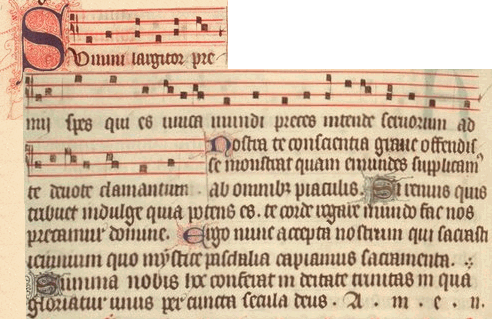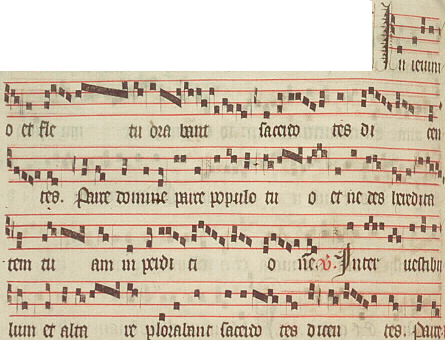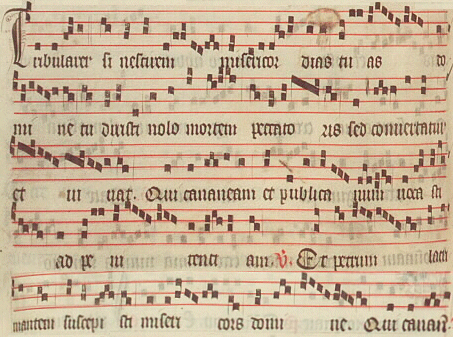READINGS: LENT THURSDAY IV

Invitatory Psalm & BACK

PSALMS AND BACK
אֲשֲׁר בְּתוֹרַת יְהוָה יֶהְגֶּה — פִּרְיוֹ יִתֵּן בְּעִתּוֹ
Even Years: Numbers 3:1-13; 8:5-11 1 וְאֵלֶּה
תּוֹלְדֹת
אַהֲרֹן
וּמֹשֶׁה בְּיוֹם
דִּבֶּר
יְהוָה
אֶת־מֹשֶׁה
בְּהַר סִינָי׃
| 1 These were the descendants of Aaron and Moses, at the time when Yahweh spoke to Moses on Mount Sinai. 2 These were the names of Aaron's sons: Nadab the eldest, then Abihu, Eleazar and Ithamar. 3 Such were the names of Aaron's sons, priests anointed and invested with the powers of the priesthood. 4 Nadab and Abihu died in Yahweh's presence, in the desert of Sinai, when they offered unauthorised fire before Yahweh. They left no children and so it fell to Eleazar and Ithamar to exercise the priesthood under their father Aaron. 5 Yahweh spoke to Moses and said: 6 Muster the tribe of Levi and put it at the disposal of the priest Aaron: they must be at his service. 7 They will undertake the duties incumbent on him and the whole community before the Tent of Meeting, in serving the Dwelling, 8 and they will be in charge of all the furnishings of the Tent of Meeting and undertake the duties incumbent on the Israelites in serving the Dwelling. 9 You will present the Levites to Aaron and his sons as men dedicated; they will be given to him by the Israelites. 10 You will register Aaron and his sons, who will carry out their priestly duty. But any unauthorised person who comes near must be put to death. 11 Yahweh spoke to Moses and said: 12 Look, I myself have chosen the Levites from the Israelites instead of all the first-born, those who emerge first from the womb in Israel; the Levites therefore belong to me. 13 For every first-born belongs to me. On the day when I struck down all the first-born in Egypt, I consecrated all the first-born in Israel, human and animal, to be my own. They are mine, Yahweh's. 8:5 Yahweh spoke to Moses and said, 6 'Separate the Levites from the Israelites and purify them. 7 This is how you must purify them: you will sprinkle them with purifying water, and they will shave their bodies all over and wash their clothes. They will then be clean. 8 They will then take a young bull, with the accompanying cereal offering of fine flour mixed with oil, and you will take a second young bull for a sacrifice for sin. 9 You will then bring the Levites in front of the Tent of Meeting, and assemble the whole community of Israelites. 10 Once you have brought the Levites before Yahweh, the Israelites will lay their hands on them. 11 Aaron will then offer the Levites, making the gesture of offering before Yahweh on behalf of the Israelites, admitting them to Yahweh's service. | ||
Odd Years: Hebrews 9:11-28 Χριστὸς
δὲ
παραγενόμενος
ἀρχιερεὺς τῶν
γενομένων
ἀγαθῶν
Hebrews 9:11-28 11 But now Christ has come, as the high priest of all the blessings which were to come. He has passed through the greater, the more perfect tent, not made by human hands, that is, not of this created order; 12 and he has entered the sanctuary once and for all, taking with him not the blood of goats and bull calves, but his own blood, having won an eternal redemption. 13 The blood of goats and bulls and the ashes of a heifer, sprinkled on those who have incurred defilement, may restore their bodily purity. 14 How much more will the blood of Christ, who offered himself, blameless as he was, to God through the eternal Spirit, purify our conscience from dead actions so that we can worship the living God. 15 This makes him the mediator of a new covenant, so that, now that a death has occurred to redeem the sins committed under an earlier covenant, those who have been called to an eternal inheritance may receive the promise. 16 Now wherever a will is in question, the death of the testator must be established; 17 a testament comes into effect only after a death, since it has no force while the testator is still alive. 18 That is why even the earlier covenant was inaugurated with blood, 19 and why, after Moses had promulgated all the commandments of the Law to the people, he took the calves' blood, the goats' blood and some water, and with these he sprinkled the book itself and all the people, using scarlet wool and hyssop; 20 saying as he did so: This is the blood of the covenant that God has made with you. 21 And he sprinkled both the tent and all the liturgical vessels with blood in the same way. 22 In fact, according to the Law, practically every purification takes place by means of blood; and if there is no shedding of blood, there is no remission. 23 Only the copies of heavenly things are purified in this way; the heavenly things themselves have to be purified by a higher sort of sacrifice than this. 24 It is not as though Christ had entered a man-made sanctuary which was merely a model of the real one; he entered heaven itself, so that he now appears in the presence of God on our behalf. 25 And he does not have to offer himself again and again, as the high priest goes into the sanctuary year after year with the blood that is not his own, 26 or else he would have had to suffer over and over again since the world began. As it is, he has made his appearance once and for all, at the end of the last age, to do away with sin by sacrificing himself. 27 Since human beings die only once, after which comes judgement, 28 so Christ too, having offered himself only once to bear the sin of many, will manifest himself a second time, sin being no more, to those who are waiting for him, to bring them salvation.
| | ||
Even Years:
Οἱ τῆς ἀληθείας κήρυκες, καί τῆς θείας χάριτος γενόμενοι λειτουργοί, ὅσοι ἐξ ἀρχῆς μέχρις ἡμῶν κατά τούς ἑαυτῶν καιρούς ἕκαστος τό σωτήριον ἡμῖν τοῦ Θεοῦ διεσάφησαν θέλημα, φασί, μηδέ οὕτω Θεῷ εἶναι φίλον τε καί ράσμιον, ὡς ἡ ἐκ μετανοίας ἀληθοῦς ἐπ᾿ αὐτόν τῶν ἀνθρώπων ἐπιστροφή. Ὅπερ μάλιστα τῶν ἄλλων θειότερον ὑπάρχον δεῖξαι βουλόμενος ὁ θεαρχικός τοῦ Θεοῦ καί Πατρός Λόγος μᾶλλον δέ καί πρῶτον καί μόνον τῆς ἀπείρου ἀγαθότητος γνώρισμα, κατά τινα ἄῤῥητον συγκαταβάσεως τρόπον, διά σαρκός ἡμῖν ὁμιλῆσαι ἠξίωσεν, ἐκεῖνα καί δράσας καί παθών καί εἰπών, δι᾿ ὧν ἔδει ἡμᾶς, ἐχθρούς ὄντας καί πολεμίους καταλλαγῆναι τῷ Θεῷ καί Πατρί, καί τῆς μακαρίας ζωῆς ξενωθέντας, πρός αὐτήν πάλιν ἐπαναχθῆναι. Οὐ μόνον γάρ τοῖς θαύμασι τάς νόσους ἡμῶν ἰάσατο, καί διά παθημάτων τάς ἀσθενείας ἀναλαβών, καί διά θανάτου ἀποδούς ὡς ὑπεύθυνος ὁ ἀναμάρτητος τό ἡμέτερον ὄφλημα τῶν πολλῶν καί φοβερῶν ἡμᾶς ἠλευθέρωσεν ἐγκλημάτων ἀλλά καί πολυτρόπως διδάσκων, ἴσους ἑαυτῷ γενέσθαι κατά τήν φιλάνθρωπον ἕξιν, καί τήν εἰς ἀλλήλους τελείαν ἀγάπην, βουλομένους βεβούληται. Διά τοι τοῦτο, Οὐκ ἦλθον καλέσαι δικαίους, ἐβόα, ἀλλά ἁμαρτωλούς εἰς μετάνοιαν. Καί, Οὐ χρείαν ἔχουσιν οἱ ἰσχύοντες ἰατροῦ, ἀλλ᾿ οἱ κακῶς ἔχοντες. Καί, Ζητῆσαι, καί σῶσαι τό ἀπολωλός, ἐληλυθέναι. Καί, Πρός τά πρόβατα, τά ἀπολωλότα οἴκου Ἰσραήλ ἀπεστάλθαι. Καί τήν βασιλικήν ἀνασώσασθαι εἰκόνα, ὑπό τήν δυσωδεστάτην τῶν παθῶν κόπρον γεγενημένην παραγεγονέναι, διά τῆς δραχμῆς παραβολικῶς παρῃνίξατο. Καί, Ἀμήν λέγω ὑμῖν ὅτι χαρά γίνεται ἐν οὐρανῷ καί ἐπί γῆς, ἐπί ἑνί ἁμαρτωλῷ μετανοοῦντι. Διά τοῦτο τόν λησταῖς περιπεσόντα, καί γυμνωθέντα πάσης περιβολῆς, καί ταῖς πληγαῖς ἡμιθανῆ γεγενημένον, οἴνῳ καί ἐλαίῳ καί καταδέσμοις ἀνέῤῥωσε καί ἐπί τό ἴδιον κτῆνος ἀναβιβάσας, τῷ πανδοχεῖ παρατίθεται καί τά πρός ἐπιμέλειαν ἀρκοῦντα δούς, ἐπηγγείλατο καί τά προσδαπανώμενα δώσειν ἐπανερχόμενος. Διά τοῦτο πρός τήν ἐπιστροφήν τοῦ ἀσώτου υἱοῦ τόν πανάγαθον πατέρα ἐπικλιθῆναί φησι, καί ἀσπασάμενον τόν αὐτόν διά τῆς μετανοίας ἀνδραμόντα, τῷ κάλλει τῆς πατρικῆς πάλιν κατακοσμῆσαι δόξης, οὐδοτιοῦν περί τῶν προτέρων μεμψάμενον. Διά τοῦτο τό τῆς θείας ἑκατοντάδος ἀποφοιτῆσαν πρόβατον, ἐπί τά ὄρη καί τούς βουνούς πλανώμενον εὑρών, οὐκ ἐλαύνων, οὐδέ μόχθῳ κατατρίβων πρός τήν μάνδραν ἐπανήγαγε τῶν προβάτων ἀλλά τῶν ὤμων ἐπιθείς τῶν ἰδίων, πρός τά σύννομα συμπαθῶς διεσώσατο. Διά τοῦτο, Δεῦτε πρός με, πάντες οἱ κοπιῶντες καί πεφορτισμένοι τῇ καρδίᾳ, κἀγώ ἀναπαύσω ὑμᾶς, ἀνέκραγε. Καί, Ἄρατε τόν ζυγόν μου ἐφ᾿ ὑμᾶς ζυγόν δέ λέγων, τάς ἐντολάς ἤγουν τόν εὐαγγελικῶς εὐθυνόμενον βίον φορτίον δέ, τό δοκοῦν εἶναι τῆς μετανοίας ἐπίπονον Ὁ γάρ ζυγός μου, φησί, χρηστός καί τό φορτίον μου ἐλαφρόν. Καί πάλιν θείαν δικαιοσύνην καί ἀγαθότητα διδάσκων, παρακελεύεται λέγων Γίνεσθε ἅγιοι καί γίνεσθε τέλειοι γίνεσθε ἐλεήμονες γίνεσθε οἰκτίρμονες, ὡς ὁ Πατήρ ὑμῶν ὁ οὐράνιος. Καί, Ἄφετε , καί ἀφεθήσεται ὑμῖν. Καί, Ὅσα θέλετε ἵνα ποιῶσιν ὑμῖν οἱ ἄνθρωποι, ὁμοίως καί ὑμεῖς ποιεῖτε αὐτοῖς. Odd Years: Origenes, Commentary on Romans (Lib 3, 8: PG 14, 950-951)
|
| Prayer |

